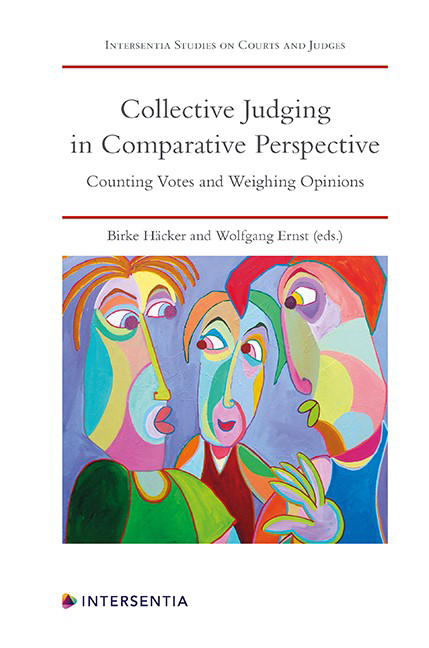Book contents
- Frontmatter
- Preface
- Contents
- List of Cases
- List of Contributors
- PART I DESIGNING COLLEGIATE COURTS’DECISION-MAKING PROCESSES
- PART II COLLEGIATE COURTS IN THE COMMON LAW TRADITION
- PART III COLLEGIATE COURTS IN THE EUROPEAN CIVIL LAW TRADITION
- PART IV COLLEGIATE COURTS IN A NON-EUROPEAN CIVIL LAW JURISDICTION: THE CASE OF JAPAN
- PART V SUPRANATIONAL AND INTERNATIONAL COLLEGIATE COURTS
- PART VI VOICES FROM THE AUDIENCE AND CLOSING REMARKS
- About the Editors
Chapter 18 - Should Judges Tell Us What They Think?
Published online by Cambridge University Press: 09 February 2021
- Frontmatter
- Preface
- Contents
- List of Cases
- List of Contributors
- PART I DESIGNING COLLEGIATE COURTS’DECISION-MAKING PROCESSES
- PART II COLLEGIATE COURTS IN THE COMMON LAW TRADITION
- PART III COLLEGIATE COURTS IN THE EUROPEAN CIVIL LAW TRADITION
- PART IV COLLEGIATE COURTS IN A NON-EUROPEAN CIVIL LAW JURISDICTION: THE CASE OF JAPAN
- PART V SUPRANATIONAL AND INTERNATIONAL COLLEGIATE COURTS
- PART VI VOICES FROM THE AUDIENCE AND CLOSING REMARKS
- About the Editors
Summary
This delightful conference provided a rare opportunity to learn more about how judges think. In the courses I teach in an American law school, my students and I try to understand how judges reach their decisions. We follow the logic of the court‘s argument and then reconstruct the argument for the losing side – which often seems to us at least as persuasive as the argument that convinced the court. By the end of the term, after we have discussed several dozen appellate opinions, the students conclude that a cogent legal argument can usually be made for each side. It is clear to us that judicial decision-making involves more than simply choosing a good legal argument over a bad one. When we try to decide one of the cases ourselves, whichever way we come out, we sometimes find that the arguments that convince us are not mentioned in the opinions. A judge sometimes reveals a significant fact or argument – borrowing a term from poker, we call it the tell – a fact, factor, or argument that finds its way into the opinion even though it is not relevant to the elements of the cause of action. We can never be certain about the role the factor played in the decision, and we often wish we could ask the judge. This conference promised the kind of opportunity I have long been seeking.
The conference focused on the complicated questions that arise when judges decide cases collectively. As the distinguished judges reflected on that process, it seemed to me they would first have to discuss how they reach their individual decisions. And since they are of course aware of the difficulty of the task, it also seemed they would want to discuss among themselves how they decide between competing legal arguments when both are good enough to anchor the decision in the law.
My hopes, however, were somewhat disappointed. The judges avoided discussing both how they reach their conclusions and why it seems best to suggest that the correct result is always clear. At the same time, several judges described elements of the process that suggest that deciding cases involves more than simply applying the law to the facts.
- Type
- Chapter
- Information
- Collective Judging in Comparative PerspectiveCounting Votes and Weighing Opinions, pp. 323 - 326Publisher: IntersentiaPrint publication year: 2020



